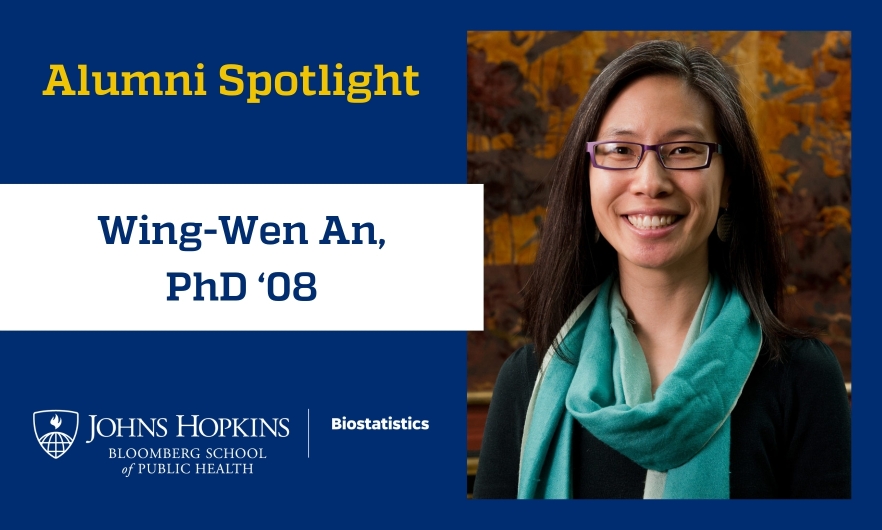Ming-Wen An, PhD '08
Ming-Wen An, PhD '08, is currently an associate professor in the Department of Mathematics at Vassar College.

Ming-Wen An, PhD '08, is currently an associate professor in the Department of Mathematics at Vassar College, a small four-year undergraduate liberal arts college in Poughkeepsie, NY. She writes, “Increasingly more small liberal arts schools are seeking to expand their statistics programs (often housed in a Department of Mathematics), so if you enjoy working with undergraduates and getting them excited about statistics, now is an especially good time for such opportunities.”
An's thesis, under the direction of Constantine Frangakis, was entitled "On the Importance of Designs in Better Addressing Missing Data Due to Death and to Loss-to-Followup."
How did you get interested in the field of biostatistics? What was your background before enrolling at Hopkins?
During the summer after my first year of college, I interned with the Division of Biostatistics at the Mayo Clinic (Minnesota). I had an excellent mentor who invited me to all of his meetings with his collaborators (medical researchers), where in the first few minutes of the meeting he asked the collaborator to describe to me the medical context. They then proceeded with a dialogue on the research questions and statistical issues. Outside of meetings, my mentor took time to introduce me to basic statistical thinking (I hadn't had any formal statistics courses yet). I also was paired with a data analyst who trained me in statistical software (SAS) and assigned me projects. It was a summer of "learning by doing" (or "watching," in some cases). I was fascinated by the integration of math / statistical thinking and "real-world" medical problems, and how by the very nature of collaborative work, there's always something new to be learned either about statistics or about medicine. I was intrigued enough by this first summer internship that I returned the following summer, and then again for two years after college as a "data analyst" before applying to graduate school.
Describe your current position and responsibilities in a way that will inform prospective students about career opportunities in biostatistics.
I am currently an associate professor in the Department of Mathematics & Statistics at Vassar College, a small 4-year undergraduate liberal arts college in Poughkeepsie NY. My responsibilities include teaching (undergraduates), research, and service, with a heavy emphasis on the former two.
How did Johns Hopkins Biostatistics prepare you for your career? What aspects of the program did you find most useful?
Aside from the thesis research which expectedly prepared me for a career in research, some "well-defined" aspects that prepared me for my current role include: (1) teaching assistantship; (2) consulting in the Consulting Center and among peers; and (3) collaborative projects.
(1) In my role as a TA, I enjoyed a range of responsibilities including grading homework & exams, planning & leading lab discussions, helping to draft exams, and holding office hours.
(2) My role as a consultant in the Consulting Center (30-minute one-on-one drop-in sessions) helped me work on skills such as communication, statistical thinking about problems, and "on-the-spot" thinking. I also had many informal "consulting sessions" among peers from around the School of Public Health, which introduced me to fascinating research in public health (which I sometimes share now with my students who are exploring career options).
(3) I had the opportunity to engage in several collaborative projects through my training grant (Clinical Trials/Epidemiology) and through other less formal mechanisms. All of these gave me experience in data analysis and working in longer-term collaborations.
What are your favorite memories of your time at Johns Hopkins Biostatistics?
My favorite memory from Hopkins Biostatistics is definitely the people (students and faculty alike). One of the reasons I initially chose Hopkins was the warm feeling of family and camaraderie in the department and this remains one of my fondest memories. The people are central to all my memorable experiences such as department retreats (Hershey, Pennsylvania; Maryland's Eastern Shore); lunch in our student offices; conversations on topics from statistics to life; study sessions; etc. In addition to the people, another favorite (though odd) memory is the space (3rd floor JHSPH) where we happily spent much of our time as students.
Is there any other information about your experience at Hopkins that would be useful for prospective students?
Though I had one formal thesis advisor, in actuality I had multiple advisors/mentors among all of the biostats faculty. An advantage of a smaller department is that students not only get to know each other, but also the faculty, fairly well. I benefited greatly from being able to work with different faculty members formally through mentored projects and informally through conversations in the office or hallway. Working with different faculty on research projects introduced me to not only different areas of research, but also different styles of doing research and approaching problems. I'd encourage all students to take advantage of and soak in the brilliance, intelligence, and generosity of the Hopkins faculty.
